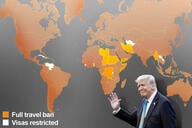You have /5 articles left.
Sign up for a free account or log in.
Andrew Orta, a professor of anthropology at the University of Illinois at Urbana-Champaign, selected an unusual topic for his new book -- the “global M.B.A.” In Making Global MBAs: The Culture of Business and the Business of Culture (University of California Press), he discusses how they are made. He responded via email to questions about his book.
Q: Why did you decide to focus on M.B.A.s?
A: The origin of the book is in my observations of the rise of “global studies” on university campuses over the late ’90s and early 2000s. My background is in Latin American studies, and area studies had already been declared defunct, as an inheritance of colonial scholarship made further passé by forces of globalization that were erasing regional and national distinctions. The rise of global studies struck me as an interesting modification of this “flat-world” thesis of some models of globalization, since it recuperated a certain kind of regionalism marked by national and cultural differences, but -- much like official multiculturalisms of the time -- did so in ways entirely congenial to the neoliberal moment.
So, I was interested in this “area studies lite” and the way a world of differences was being embraced and packaged for relatively low-impact consumption. Looking around U.S. campuses, business schools were a high-prestige exemplar of this trend. M.B.A. programs, especially, were promoting themselves as “global.” If I wanted to understand how this renaissance of regionalism squared with neoliberal framings of global capitalism, I couldn’t find a better research site!
Q: What does global M.B.A. mean?
A: The book examines the “global M.B.A.” -- both the business school program and the person holding the credential -- as a claim about the character of contemporary capitalism asserted by institutions that are influential in its making. M.B.A. programs today all promise to train students to do business in a world in which all business is global. What they deliver, however, involves an interesting sleight of hand. Although based on the premise that the world is filled with different places, global M.B.A.s are trained to do business anywhere. They are business generalists able to, literally, manage differences. Some of this comes from what business schools think recruiters want: rather than an earlier model of someone from the home office posted long-term to another country, the ideal global M.B.A. is someone who can move through a variety of international postings and work as part of multinational and multicultural teams. One of the core arguments in the book turns around the ways that the global components of M.B.A. education are less about teaching M.B.A.s about other parts of the world and more about cultivating talents and facets of themselves as business leaders and entrepreneurs. For the global M.B.A. student, it is less about “them” or “there” and more about “me.”
Another component of the rise of the global M.B.A. has to do with the global market for the production of M.B.A.s. Business education in the U.S. saw a tremendous expansion of M.B.A. programs over the 1980s and 1990s. However, M.B.A. program capacity was soon well beyond any sort of sustainable domestic demand. International students have tended to take up the enrollment slack in the overbuilt infrastructure of U.S. M.B.A. programs.
As M.B.A. programs became increasingly focused on a version of global studies that recognized and packaged cultural differences in manageable ways, the high percentage of international students in many M.B.A. programs provided the perfect embodiment of manageable cultural difference. M.B.A. programs have marketed this to domestic M.B.A.s as part of the “global” flavor of their experience. The current enrollment declines in M.B.A. programs, leading to the shuttering of some in recent years, seem largely led by declining applications from international students. Some of that reflects concerns on the part of prospective international M.B.A.s about current visa and immigration policy and the political atmosphere in the U.S. But it is worth noting that these students also find themselves with a range of options for business education elsewhere in the world. It is a separate question whether this more globally distributed network of M.B.A. programs and enrollments create opportunities for a wider decentering of business training -- a more truly global M.B.A.
Q: How do leading M.B.A. programs teach their students to think and act globally?
A: Beyond the international composition of M.B.A. cohorts and the infusion of global business themes in core M.B.A. courses, often through international case studies, the primary curricular component for teaching M.B.A.s to think and act globally is the short-term international trips that have become part of all of the leading M.B.A. programs over the past two decades. These brief overseas immersion experiences are designed to give M.B.A.s a glimpse of global cultural variety, and most of the M.B.A.s I’ve spoken with see them as résumé-building demonstrations of their capacities to work globally.
In all of this, M.B.A. students get both more and less than they bargained for. They get more because, despite the common refrain that M.B.A.s learn little in their two years, and that they are there mainly for the networking and the credential, M.B.A. programs systematically shape an orientation grounded in fast-paced decision making based on limited and often simplified knowledge about the world. They get less because when these habits are applied to international business contexts, they add up to a very narrow global vision.
The research revealed for me the ways business schools inculcate an orientation to the world deeply connected to ideas about business leadership. As an anthropologist, I’m struck by the relative narrowness of that view as M.B.A. programs preach an openness to a world of differences, but set up techniques of engagement that embrace differences in some of the least unsettling ways possible. I think an important insight of the book is that business schools are not simply doing a bad job of understanding a culturally complex world. They’re not struggling to make sense of inconvenient differences. In many ways, they’re committed to making a difference. The contemporary moment of capitalism (like others that preceded it) requires specific kinds of difference -- today these are the edges of emerging markets, untapped populations of consumers and an aura of newness, uncertainty and manageable risk that makes international business ventures potentially lucrative and requires the talents of M.B.A.s. In routinizing the ways global M.B.A.s approach the world, business programs are also routinizing the sorts of differences M.B.A.s find there.
Q: How does “M.B.A. culture” come into play? How do M.B.A. programs teach culture?
A: As an anthropological study of M.B.A. training, the book approaches M.B.A. programs and business practices not as eternal truths or natural facts, but as shaped by the various social, cultural, historical, political and economic contexts. The students seeking the M.B.A. degree, the faculty who teach them, the administrators who shape and market the programs … all are involved in the production and reproduction of the M.B.A. as a cultural ideal. The book documents M.B.A. programs as reflecting and instilling specific cultural values keyed to the current moment of capitalism.
M.B.A. programs shape specific sorts of sensibilities thought of as integral to the M.B.A., for whom technical business knowledge is only part of the business tool kit. They do this through the pace of the program and the cultivation of a sense of the M.B.A. experience as involving an overwhelming flow of information and deadlines. This underscores a core message: the world is always more complex than can ever be fully measured or known, and so part of successful business management requires a talent for quickly seizing on key facts, prudently ignoring irrelevant details and creatively filling in blanks to create a simulation of the world based on which effective decisions can be made. This is a theory about the nature of business (which is always too fast paced in this telling to allow for careful, thoughtful understanding) as well as about the nature of the successful M.B.A. leader, who must combine technical skills with talent, gut instinct and other ineffable qualities.
Along with detailing this culture of business education, the book discusses how M.B.A. programs talk about culture itself. They draw from a variety of work in the business literature attempting to quantify cultural difference as a measure of distance. This offers M.B.A.s what appear to be clear-cut ways of characterizing and strategizing for, say, how organizational hierarchy may be different in China than in the U.S. At the same time, very few people really believe this. Most recognize that culture always exceeds these sorts of efforts to quantify it. In fact, if the ideal M.B.A. combines nuts-and-bolts technical skills with more innate ineffable talents for managing the irreducible complexities of the real world, “culture” stands as a primary example of the need for M.B.A.s.
Q: What was it like as an anthropologist to study another part of the university?
A: I approached M.B.A. students and business school faculty and administrators as subjects of anthropological study. Much as I’ve done in other ethnographic work, I did my best to learn their language, and I spent time with them, doing what they do: attending class, working on team assignments and shadowing cohorts in a variety of programs. I also conducted interviews with dozens of M.B.A. students and faculty, but it was the time spent participating in the M.B.A. experience itself that was most important because, as anthropologists know, it’s usually what’s not said that turns out to be most illuminating. Business schools and anthropology departments tend to be separate worlds on most campuses, so I often felt out of place. But it was not very difficult to arrange approval for my research at most of the programs I studied, and many business faculty were interested in the project.
There is a long history of anthropologists telling economists and related theorists of capitalism that their assumptions about human nature and the models of the world that they inform are not borne out in the empirical world. This is the case for the non-Western settings of stereotypical anthropological research. It is equally true for business practices at the core of Western economies, where capitalism in the wild does not often look like the models and theories. This continues to be a good point for anthropologists to make, especially at a time when business logics infuse so many aspects of daily life, and the authority of business schools helps to naturalize that logic.




